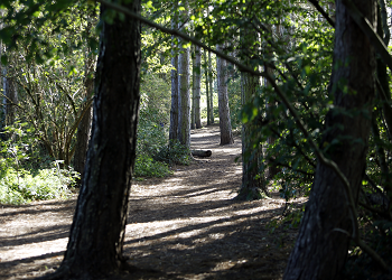Bouskell Park Archaeology

What's clear from recent archaeological digs in Bouskell park is that the area has a rich history spanning many different eras, ranging from the Victorian era to possibly as far back as prehistoric settlement.
The many 'lumps and bumps' which are seen across the park today are not just natural topography. They are in fact scars of the past, traces of settlements been and gone.
Victorian era
The entire surrounding area around Blaby Hall including the whole of Bouskell Park and the Long Walk, were pleasure grounds attached to the house where hunting among other things took place. Recent archaeological finds in Bouskell Park include a lead musket ball and a Victorian Crown silver coin.
The area may have been the grounds of an even earlier Hall which existed on the same site as Blaby Hall, dating back to the seventeenth century.
In constructing Blaby Hall in 1837, the area which is now Bouskell Park was extensively landscaped, erasing surface traces of the past. Archaeology in the park revealed that the top layer of soil across the entire park, was of different composition to the natural topsoil of the area. This means that the Victorian landscapers brought in thousands of tonnes of topsoil from elsewhere to coat the ground in order to shape the pleasant landscape we see today.
Just a few years after the construction of Blaby Hall, the Ice House was built in 1843 which can be found newly-restored in Bouskell Park. This Ice House supplied ice all-year-round to be used in the preparation of frozen and chilled desserts such as ice cream. Only the wealthiest people in the country could afford to maintain these structures, alluding to the status of the Hall's inhabitants. You can book tours of the Ice House and the park on our Ice House page.
Find out more about Blaby Hall on our Blaby Hall page.
Medieval era
The park saw a peak of activity in the High Medieval period (twelfth to fourteenth centuries). The vast majority of archaeological finds in this park are pottery fragments from this era.
In this period, the area was a new development on the outskirts of the historic village of Blaby and featured many houses with small plots of land where crops were grown and small industry took place such as pottery manufacture. The vast majority of finds from the archaeology were pottery fragments from this era.
These settlements have left their scars on the park and are still visible today. Many of the long ridges running through the park are scars from fences, walls and hedgerows separating the farmsteads. There is also two long gullies running through the park which are scars of two sunken trackways from this period over which walked the people and their horses and carts.
In the late Medieval period, from the late fourteenth century, all traces of settlement disappear as backed up by the archaeological survey. This was common across England in this period as successive plagues and famines struck. The area would be reduced to small scale land holdings until the Victorian period.
Even older?
A few traces of Anglo-Saxon, Roman and Normal pottery fragments were also unearthed in the dig and could potentially point to even earlier settlements by these groups. Blaby itself was first mentioned in the Domesday Book of 1086.
Even some prehistoric worked flint fragments were found in the park's soil, so perhaps the area is even older than the history books tell us...
- Events
- Competition Terms and Conditions
- Uncover The Story
- Inspiration
- Blaby District Heritage Trails
- Blaby District Tourism Map and Guide
- Watch our Tourism Video
- Attractions
- Food and Drink
- Stay
-
Heritage
- Braunstone Heritage Archive Group
- Narborough Train Station
- Blaby Heritage and Museum Society
- Bouskell Park Ice House
- Cosby Heritage Society
- Glenfield Tunnel
- High Cross Monument
- Iron Age Shield
- Kirby Muxloe Castle
- Kirby Muxloe Garden of Remembrance
- Narborough Arms
- Blaby War Memorial
- Sharnford War Memorial
- Narborough Hall
- Blaby Hall
- Bouskell Park Archaeology
- Fosse Foxes
- Walking Trails and Open Spaces
- Fitcation - Active Escapes in Leicestershire
- Travelling to and around Blaby District
- Taste The Place
- Cosby Yarn Bomb